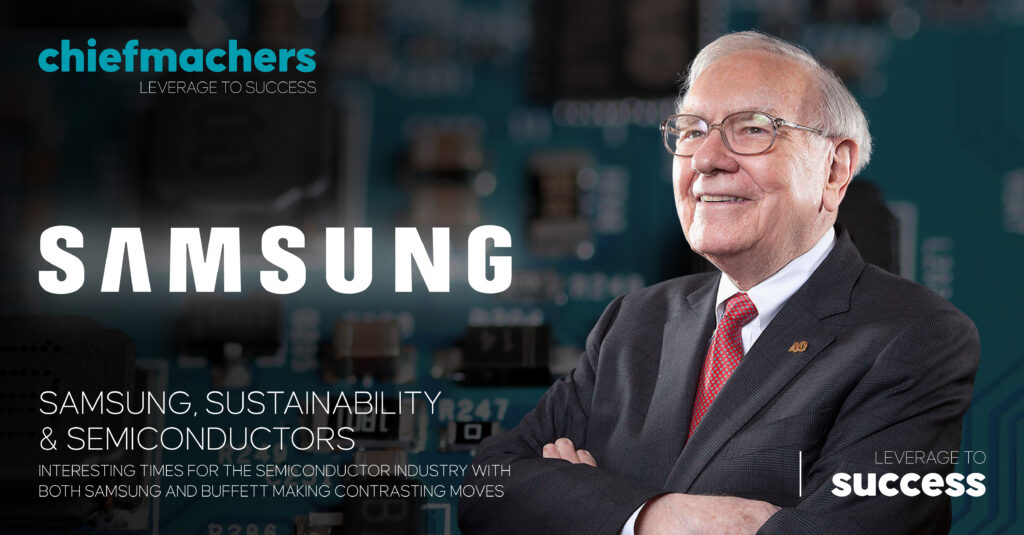Interesting times for the semiconductor industry with both Samsung and Buffett making contrasting moves

In the rapidly evolving world of technology, major shifts are occurring that could have a profound impact on the future of the semiconductor industry. Two recent news events encapsulate this dynamic landscape: Samsung’s revolutionary partnership with Extreme Tech Challenge (XTC) to promote sustainability in tech startups, and the recent news about Warren Buffett’s company, Berkshire Hathaway, selling its stake in the world’s largest chipmaker, Taiwan Semiconductor Manufacturing Company (TSMC).
Samsung’s move marks a significant step towards a more sustainable tech industry, particularly in the semiconductor sector. The company’s partnership with XTC and the launch of the Samsung Climate & Circularity Tech Challenge represent its commitment to the principles of the circular economy, fostering a new wave of green startups, and promoting innovative, sustainable solutions in the semiconductor industry.
In the meantime, the market witnessed an unexpected move from Warren Buffett’s Berkshire Hathaway, which decided to divest from TSMC. This was a surprising turn of events given TSMC’s stature as the world’s largest chipmaker and a critical player in the global supply chain, driving the production of a vast range of digital technologies.
While Berkshire Hathaway’s decision may seem counterintuitive in the face of an ongoing global chip shortage, it reflects the volatility and unpredictability of the tech sector. It could also suggest that investors like Buffett are evaluating tech companies on parameters beyond just market dominance, like sustainability efforts, long-term resilience, and adaptability to emerging market trends. There are also geopolitical issues at play. To say the least, the current tensions between China and the US are on the rise. One knock-on effect of this is that major resources are being allocated in The States to build chip factories (source) on American soil. This may well have been a factor in Buffett’s view of TSMC as a long-term investment.
At a time when sustainability has emerged as a key theme in the tech industry, Samsung’s strides towards a circular economy may create a competitive advantage that can influence investor decisions. In this context, the Samsung Climate & Circularity Tech Challenge presents a unique opportunity for startups to carve out a niche for themselves in the realm of sustainable technology, particularly in the semiconductor industry.
The combined goal of Samsung and XTC is to promote sustainability in technology startups, focussing on the circular economy. This move is part of Samsung’s broader commitment to sustainability, aiming to reduce their environmental footprint across four core areas – mobile devices, televisions and audio systems, home appliances and semiconductors.
In essence, the circular economy is a sustainable business model that aims to eliminate waste, continually utilise resources and create an economic system that is regenerative by design. Looking at the amount of e-waste (dource), its relevance in the contemporary technology sector cannot be overstated. Samsung’s initiative in embracing it could well influence others in the sector to follow suit.
One of the initiatives under this partnership is the Samsung Climate & Circularity Tech Challenge. This competition invites startups to present innovative solutions that align with the circular economy principles. It represents a clear and promising signal that Samsung is not only committing to more sustainable operations but also actively fostering the growth of green startups.
This move resonates with the broader trends in the semiconductor industry, which has been increasingly focusing on sustainability due to both regulatory pressures and consumer demands. At the same time there is a heavy focus on the sustainability of semiconductor production and a huge global demand for increased production. In the UK, the government is set to release its strategy to deal with these issues. Meanwhile, The EU has passed The EU Chips Act. This is supported by €43billion of public and private investments with the goal of doubling the EU’s share of global microchip production to 20% by 2030. According to the Semiconductor Industry Association, global semiconductor companies have been investing heavily in water and energy efficiency, as well as waste and emissions reduction.
The Samsung Climate & Circularity Tech Challenge presents myriad opportunities for startups. Not only does it provide them a platform to showcase their innovations to a global audience, but it also opens possibilities for financial support, mentorship and networking with industry leaders. Startups with viable solutions can benefit from Samsung’s extensive resources, market reach and technological expertise.
Furthermore, this competition could potentially lead to startups collaborating with Samsung on projects or being incorporated into Samsung’s supply chain, accelerating their growth trajectory. For those in the semiconductor sector, this is a golden opportunity to introduce green technologies and practices that could revolutionise the industry.
In essence, Samsung’s partnership with XTC, emphasising the promotion of the circular economy, is a progressive stride. It aligns with broader industry trends and contributes to the global sustainability goals. The Samsung Climate & Circularity Tech Challenge is poised to empower startups to engineer solutions that are not just technologically advanced, but also environmentally responsible.
This is an exciting era for startups in the tech sector – but not without its risks. Berkshire Hathaway’s recent decision highlights such risk. However, with industry giants like Samsung championing sustainability and the circular economy, startups have both the opportunity and responsibility to redefine the technology landscape.
This partnership could very well be the catalyst that ushers in a new epoch of sustainable tech innovation. Picture a future where next-generation chips, powered by sustainable practices, drive unprecedented innovation. The digital landscape redefined. Chips capable of powering everything from AI-driven healthcare to smart cities. Maybe even space exploration. This is not just a dream but a tangible future that today’s startups are actively shaping.
It’s time to make the future the current!